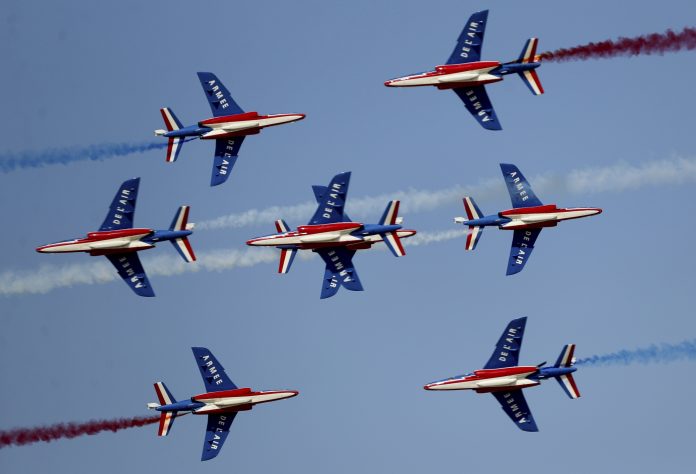
The Middle East’s biggest aviation event, the Dubai Airshow, opened Sunday without any major deals as flagship Gulf carriers rein back big-ticket purchases.
This year’s lackluster start could be seen as a reflection of the various challenges facing the industry but may also be due to the hundreds of planes already on order by Mideast airlines that have yet to be delivered.
In the only major announcement of the day, Boeing and Biman Bangladesh Airlines signed a deal for two 787-9s aircraft, which list at $292.5 million apiece. However, buyers often get better deals from manufacturers.
In contrast, there were $140 billion in new orders announced at the start of the 2013 airshow, but that was an era before global oil prices collapsed, sparking a slowdown in economic growth across the Gulf Arab region — home to the Middle East’s largest carriers.
The region’s biggest airline, Emirates, recently signed a commitment for 70 new Airbus planes worth $21.4 billion at list prices to be delivered over the next five years. At the last Dubai Airshow in 2017, the airlines announced a purchase of 40 American-made Boeing 787-10 Dreamliners in a deal worth $15.1 billion.
The airline, which feeds Dubai’s busy international airport, posted significantly lower earnings of $237 million last year due to spikes in fuel costs at the end of 2018, a strengthened U.S. dollar, lower airfreight demand and weakened travel demand.
Meanwhile, Abu Dhabi’s Etihad Airways has lost a total of $4.75 billion since 2016 as its strategy of aggressively buying stakes in airlines from Europe to Australia to compete against Emirates and fellow rival Qatar Airways exposed the company to major losses. Qatar Airways, based out of Doha, is also struggling under the weight of a continued blockade by neighboring Arab states, which have barred the carrier from their airspace and airports.
Analyst Charles Forrester said airlines around the world are looking more at smaller aircraft that can make more frequent journeys at lower costs.
There may be no starker example of this trend than the Airbus A380. Emirates was a lead customer of the superjumbo, which can carry more than 800 passengers, but the airline reduced its orders of the aircraft and it is now being phased out of production.
Forrester, a principal analyst at Jane’s IHS Markit, said companies are also finding ways to extend the life of the aircraft they already have, potentially hampering the pace of new sales.
“Fleets are now actually living a bit longer than they used to. Companies are able to keep their aircraft running a bit longer,” he said. “Rather than constantly having to buy new aircraft all the time, just refurbish them, refit them, get them going, they’re good as new.”
The biennial airshow runs for five days, leaving still some time for deals to be announced.
The show draws major commercial and military firms from around the world, as well as smaller manufacturers competing for business in the Middle East. The United States has the largest foreign country presence with around 140 exhibitors.
Officials from the U.S. Department of Defense and State Department are also at the airshow, meeting with officials from the United Arab Emirates, which is one of the world’s top buyers of American-made weapons and defense equipment.
Meanwhile, Chicago-based Boeing has used the airshow to emphasize its dedication to safety after crashes of its 737 Max killed 346 people. The planes have been grounded around the world, impacting customers like flydubai which has more than a dozen of the jets in its fleet and more than 230 on order.
Internal Boeing documents have revealed that before the crashes, company employees had raised concerns about the automated flight-control system that played a part in pushing the planes’ noses down until the jets plummeted, as well as the hectic pace of airplane production at Boeing. The company has settled dozens of lawsuits filed by families of passengers killed in the two crashes, but the terms of the settlements are being kept confidential at Boeing’s insistence.
“It’s been a very difficult time for the Max,” said Randy Tinseth, vice president of marketing for Boeing Commercial Airplanes. “I can tell you we’re very sorry for the loss of life on those accidents and we’re very sorry and apologize for the disruption that we have caused our customers.”
He said the company is working hard to make improvements to the aircraft and to make changes to the training of the aircraft to get the airplane certified by the end of the year and to have it flying by early 2020.
“Ultimately, the schedule for all of those activities will be determined by the regulators so were taking their lead,” he said.q
















